- Home
- Stephen R. Donaldson
The Man Who Fought Alone Page 10
The Man Who Fought Alone Read online
Page 10
Mostly I kept to the dais. Its elevation enabled me to pick up a general idea of how the IAMA ran team sparring.
Apparently there were eight divisions—brown belt, black belt, advanced, and something called “soft style,” all for men, with the same again for women. The silk pajamas had soft style to themselves. The other three divisions wore canvas, most of it white. The exceptions stood out like stains on damask.
As far as I could tell, the silk pajamas fought with no more or less effectiveness than anyone else. But their approach was definitely more flamboyant, with more elaborate stances, bigger arm movements, more spins. Maybe it was supposed to intimidate people.
Teams of four competed head-to-head, one member at a time. They flailed and kicked and yelled like it all meant something. The action didn’t stop as often as it did in individual kumite. The losers were eliminated, and the winners advanced. Apparently fighters “won” by accumulating points for punches or kicks that satisfied the refs. Breaking the rules produced penalties. Groins and knees were off-limits. Hitting too hard—whatever that meant—and ignoring a ref were definite no-nos. Cumulative points for each team determined the victors.
None of it made sense to me. With all the gear they wore, the contestants might’ve survived a charging rhino, so how could anyone hit them too hard? But of course I didn’t need it to make sense. I just needed to know how the game was played.
The refs issued a lot of warnings. What I saw on the fighters’ faces resembled frenzy, the same wildness you see in a horse’s eyes right before they take it out and shoot it. Several of them kept attacking after the ref called them apart.
Presumably that was normal—for a karate tournament, anyway. And it wasn’t my problem. Ned Gage was the director of referees. If things got out of hand, he could deal with it. Nevertheless the intensity pouring from the rings felt like trouble to me. Without thinking about it, I left the dais to get closer to the action.
After scanning three or four contests from the sidelines, I found the one that bothered me the most.
This match was men’s brown belt, and it pitted white against screaming scarlet. At the moment, a gangling teenager in white fought a young man who outsized him by two inches and fifty pounds. The white canvas carried a couple of patches, one the ubiquitous IAMA insignia, the other too small to read. But I couldn’t miss his opponent’s label. Big yellow letters arcing across the scarlet said, “Nelson Brick’s Killer Karate.”
Noise inundated all the rings as spectators and teams hollered in every direction, but here it sounded raw and bloodthirsty, like there was something personal at stake. Maybe when the ref declared a winner the losers would be put to death.
Right away I saw why this contest bothered me. The clown in scarlet strutted and thumbed his nose, taunting the hell out of his opponent. Whenever they engaged he said something. I couldn’t make out the words, but he was obviously sneering.
The kid grew more and more frantic with every attack. Anger and frustration cramped his punches, and most of his kicks went wild. Every time his opponent scored on him, his face turned a more desperate shade.
The audience loved it.
If I had been the ref, I would’ve disqualified them both. Sent them home to grow up. But no one here agreed with me. The Brick team encouraged their fighter by jeering at his opponent. The kid’s supporters shouted, “Hit him! Hurt him!” Meanwhile the ref called points but not breaks, and ignored everything else.
It ate at my nerves. I resisted an impulse to charge into the ring, sort out the problem myself. But I stayed ready, just in case.
A minute later, the match ended. Killer Karate won by a landslide, thanks mostly to this round. The scarlet pajamas congratulated each other like they’d just won the Battle of Britain. In contrast, none of the white pajamas consoled or commiserated with their thrashed teammate. Instead they seemed to turn their backs on him, like he’d shamed them somehow.
I figured I knew exactly what was going to happen next.
Radiating ego and humiliation, the teams moved away from the ring. Now I could see the second patch on the white pajamas. Tae Kwon Do Academy. Master Song Duk Soon’s school.
Swaggering with triumph, the clown in scarlet headed for his gear bag, apparently unaware that the kid he’d just crushed was right behind him.
Shame twisted the kid’s features like nausea. When his opponent bent to his bag, the kid aimed an elbow at his kidneys, jumping into the blow to get all his weight behind it.
That made it easy for me to catch him by the back of his pajamas and jerk him away before his elbow landed.
“Stop it!” I barked into his face, doing my best drill-instructor imitation. I wanted to break into his dismay fast. “You’re out of line!”
Before I could go on, the young Killer sprang up and spun toward me. Yelling even louder than I did, he wheeled a kick at the kid’s head.
With me holding him, the kid couldn’t protect himself. I heaved him back, turned to cover him with my right shoulder.
When the kick hit me, I staggered, and my arm went into shock. For half a second or so, astonishment paralyzed me. I would’ve sworn that was just a kick, pure stunt work, all show, but somehow he’d managed to catch me with a baseball bat instead.
Then my brain turned red, and the next thing they knew both punks hit the floor, Killer scarlet on the bottom, flushed kid next, with me on top, using one knee to hold both of them down.
“I’m going to say it again.” Under the circumstances, I thought I sounded remarkably calm. “You’re out of line. Both of you. If you want to brawl, take it outside. And I mean all the way. Off the hotel grounds.
“Are you children listening to me?”
Let them tear each other apart somewhere public. The cops could sort them out.
A crowd had already gathered. No one under me answered, so I leaned down harder. “I said, are you lis—”
Suddenly I caught a peripheral flash of scarlet, and a blow hit my sternum hard enough to drive me off the pile. Pain tugged across my abdomen, tracing the line of Estobal’s bullet. I barely caught my balance as my attacker advanced, ready to club me again.
“No, you listen, bub! This is none of your damn business! That twerp tried to hit my guy in the back. He was just defending himself!”
The man had a face like permanent apoplexy, complete with bulging eyes and an assertive mustache you could’ve used to sweep out the hall. He may’ve been six inches shorter than me, but he outweighed me easily. Every bit of him seemed to swell inside his pajamas. I thought the canvas might tear.
Across all that scarlet he wore a crisp black belt. Yellow letters over his heart identified him as Nelson Brick.
My chest felt numb, and I feared he’d torn open my guts. I wanted the .45 so badly that my good hand ached for it.
Maybe he’d back down if I spit blood at him.
Behind him, the fighters scrambled to their feet. “That’s right!” Brick’s student yelled. “He was going to hit me while I wasn’t looking!”
While I gaped for the breath, I discovered that a man in white stood between me and Brick. Somehow I hadn’t seem him arrive—he was just there. He had his back to me, but after my heart thudded a couple of times I figured out that he was Master Song Duk Soon.
“Mr. Brick,” he said in a voice like the head of a hammer, “the conduct of your team is disgraceful. He provoked the conflict.”
Oh, good. Now I had two crazy instructors on my hands.
None of the karate-ka and spectators crowding around seemed likely to back me up. They wanted more action. I was on my own.
Unless I used the cell phone.
“Master,” the beaten kid quavered. “He insulted me the whole match. He insulted you. He called Tae Kwon Do ‘a toy martial art.’”
Some of the spectators laughed—which made the kid’s flush worse. Others muttered disapproval.
As soon as I caught my breath, I’d say, Hell, kid, they’re all toys. But I wasn’t read
y yet. I still didn’t know how seriously I was hurt.
Master Soon stood with the same explosive ease I’d seen earlier. “The words of a contemptible opponent are equally contemptible,” he pronounced. Then he added to Nelson Brick, “Your student is a fool. He repeats what he was taught.”
I thought Brick might attack again. He didn’t look anywhere near as relaxed as Soon. But then a familiar voice interrupted us.
“All right, everybody,” Parker Neill called out, “break it up, break it up.” He seemed to disperse the crowd just by flapping his hands. “It’s all over. Nothing’s wrong. Get ready for your next events.”
Ned Gage accompanied him. While Parker waved away the spectators, the head referee placed himself between Soon and Brick.
I was off the hook.
The glint in Gage’s eyes looked like humor, but it may’ve been eagerness. “Master Soon,” he said calmly, “Brick sensei , your teams are disqualified. I won’t allow fighting outside the rings.”
Since no one was looking at me now, I probed the pain in my stomach. It wasn’t as bad as I’d feared. And I didn’t feel any dampness. Apparently my scars had been stretched, not torn.
“Wait a goddamn minute, Gage,” Brick blustered. “The whole team? That’s not fair. My guy was just talking. He didn’t break any rules.”
I couldn’t tell what Song Duk Soon felt. Whatever it was, he didn’t show it.
Gage grinned amiably. “I’m the Director of Referees here. Shall I disqualify your whole school instead?”
“We’re going to win this event!” Brick protested.
“If I disqualify the whole school,” Gage continued, “you’ll lose your IAMA membership.” He sounded happier by the minute. “You won’t get it back until you take one of our seminars on sportsmanship.”
To my surprise, Brick looked away. “Where’s Sternway?” he demanded. “I’m not going to put up with this.
“And I’m not”—he jabbed a finger in my direction—“going to put up with assholes from the audience interfering when my guys try to defend themselves.”
I flexed my fists, working the pain out of my right arm.
Ned Gage widened his grin, matching Master Soon’s relaxation. “Mr. Sternway won’t help you, Brick sensei.” Now he made the title sound like mockery. “We all saw what happened. The situation would’ve been worse if Mr. Axbrewder hadn’t intervened so quickly. You owe him an apology.”
Parker nodded like a man who’d seen it all before.
“Ha!” Brick snorted. “That’ll be the day.”
But he didn’t go rushing off to find Sternway. I guess he believed Gage in spite of himself. I sure as hell believed him. If there hadn’t been so many witnesses, I might’ve kissed his feet.
Still, I wanted some of my own back. Before Brick could move away, I drawled, “Listen, bozo. Maybe you have your own school. Maybe you’re a world-class ‘martial artist.’ But as far as I’m concerned, you’re just a fat thug in uncomfortable pajamas. Where I come from, we snack on guys like you. Hit me again, and I’ll break your arms.”
I’d broken Estobal’s neck just hours after he shot me.
“Try it sometime.” Brick aimed a nasty glare at me, but it turned hesitant when he saw the look on my face. “By the way,” he added roughly, “these aren’t pajamas. They’re called a gi. You should remember that.”
Then he reached out and grabbed a handful of his student’s canvas. “Come on, boy. You’re going to explain to the rest of your team how you got them disqualified.”
Jerking the young man along, he stomped away toward a cluster of scarlet gis nearby.
The action in the rings continued as if nothing had happened. Yells and padded blows punctuated the tension. Parker Neill shrugged and left. Gage waggled his eyebrows at me like a humorous salute before turning his attention back to the tournament.
I didn’t acknowledge either of them. Just for a second, the humiliation facing the young Killer distracted me. Maybe he’d brought it on himself. But he’d been taught by Nelson Brick—and Brick obviously didn’t intend to take any responsibility for what his students learned.
By the time I convinced myself to copy Parker’s shrug, Master Song Duk Soon had shifted to confront his own student.
The flushed kid stood in front of his Master, practically cowering. Soon said something in a harsher tone than he’d used with Brick. At once the kid dropped to his knees, bowed his head.
“You have disgraced me,” Soon announced distinctly. “Remove your belt. You no longer merit it. I will consider how honor may be restored.”
He didn’t stay to see whether the kid obeyed him. He simply turned his back and left.
The kid had gone stark pale, and his mouth quivered. His hands shook as he untied his belt, folded it carefully, and set it down in front of him. Bowing, he touched his forehead to the belt. When he looked up, his eyes were full of tears.
I left him there myself. I couldn’t do anything else for him. The last thing he needed right now was an audience.
I wanted to go after Master Song Duk Soon, tell him what I thought of him. Fortunately both my arm and my guts were feeling better, which allowed me to recover some common sense. That didn’t come naturally. Most days I only had common sense when I could channel it from a previous life. But after a couple of deep breaths, I remembered that nothing Soon or Brick did was any of my business. If I tried to throw my weight around with them, I’d just get myself fired.
Parker hadn’t gone far. Instead of following Master Soon, I stopped to complain to the Tournament Coordinator.
“Help me out, Parker,” I growled under my breath. “Is this normal? Do the teachers always piss on the students around here?” In case he hadn’t seen what happened, I explained, “Soon just stripped that kid’s belt.”
Parker cocked an eyebrow, glanced at me sidelong. “Like I said, Brew.” He spread his hands. “True believers.
“It’s traditional,” he went on before I could object. “Everything the student does reflects on the teacher.”
“No shit,” I muttered. “His teacher taught him to fight like that. And act like that.”
Neill nodded. “And put too much pressure on him. Made winning too important. I know what you’re saying.
“What can I tell you?” He scanned the rings while he spoke, keeping an eye on the events. “The arts we study are predominantly Asian. They all downplay individualism and emphasize respect for authority. But it takes different forms in different countries.
“Tae Kwon Do is Korean. So is Master Soon. When a Korean challenges you, he wants to prove his school is better than yours, his style is better, his country is better. The Chinese are more personal. When a Chinese challenges you, he wants to prove his sifu is better than yours. If he’s a sifu himself, then he wants to demonstrate the superiority of what he knows.
“As for the Japanese, they turn everything into spirituality.” Parker smiled distantly. “According to Gichin Funakoshi, karate doesn’t have anything to do with winning or losing. It’s about ‘perfection of character.’ A Japanese karate-ka isn’t judged by success or failure. He’s supposed to display his best skills with devotion and humility.
“You could say the Koreans care about winning, the Chinese care about looking good, and the Japanese care about not caring.”
Then he shrugged. “Those are the stereotypes, anyway. We all know lots of exceptions.”
I could think of a few myself. If the Japanese were so all-fired spiritual, why had they spent half a century trying to conquer the world?
Bad leadership, I suppose.
“The real problem here,” Parker continued in case I’d missed the point, “is that Master Soon’s student isn’t Asian. He’s obedient because he knows he’s supposed to be, and he desperately wants to be accepted. But he doesn’t really understand the way he was just treated. He thinks like an individual.
“As for Brick,” Neill finished sourly, “he’s pure-blood American. It’s all eg
o with him. He isn’t as tough as he thinks. If you ever get a chance to compare him with Sternway sensei, you’ll see the difference right away.”
I wasn’t convinced. I’d felt Brick’s strength—and I had no intention of being impressed by Sternway. But the Tournament Coordinator didn’t have to spend his time talking to me, and I wasn’t about to repay the courtesy by dissing his sensei, so I just thanked him and let him get back to work.
I wanted a change of air to clear my head, so I decided to tell Bernie I needed a break. Get out of the hall for a few minutes. Find someplace where the AC was set on high, maybe lie down on the floor and practice breathing.
When I looked around for the Security Chief, however, I spotted Deborah Messenger across the rings. In fact, she seemed to be staring in my direction. She must’ve returned while I was concentrating on Brick and Soon.
Suddenly I didn’t give a shit about Killer Karate, the Tae Kwon Do Academy, or their poor abused students.
Since I was supposed to be a dignitary, I didn’t rush straight toward her. Instead I started to pick my way through the crowds around the hall.
She turned away as I moved. Oh, well. As long as she didn’t leave before I reached her—After a minute or so, I saw her talking to Sternway, Lacone, and Sammy Posten.
OK, she was busy. No need to hurry.
Partway around the walls, I came on Ned Gage. He was watching another round of team kumite, but he didn’t seem to be engrossed in it, so I stopped to thank him for getting Brick off my case.
He was shorter than Neill, and pudgier. Apparently being a balls-to-the-wall martial artist didn’t mean you had to stay slim. Brush-cut hair, a wide mouth, and a mustache that only looked straight when he grinned emphasized the roundness of his face. Judging by the lines on his cheeks and around his eyes, he grinned a lot. If I hadn’t already seen him in action, I wouldn’t have believed he had enough personal authority to button his blazer. Nevertheless he carried himself with the same relaxation I’d already noticed in men like Sternway and Soon, pliant and worrisome as Semtex.

 The Illearth War
The Illearth War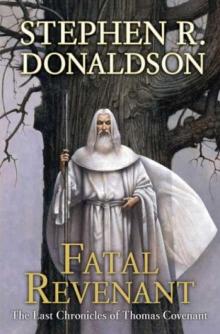 Last Chronicles of Thomas Covenant 02 - Fatal Revenant
Last Chronicles of Thomas Covenant 02 - Fatal Revenant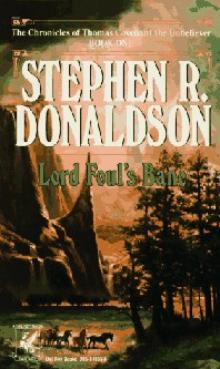 Lord Foul's Bane
Lord Foul's Bane The Gap Into Ruin: This Day All Gods Die
The Gap Into Ruin: This Day All Gods Die White Gold Wielder
White Gold Wielder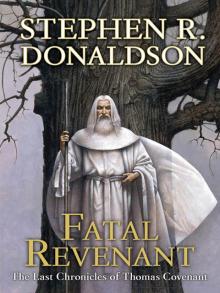 Fatal Revenant
Fatal Revenant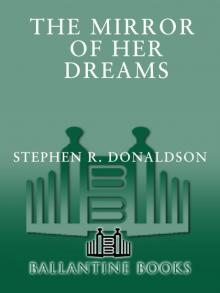 The Mirror of Her Dreams
The Mirror of Her Dreams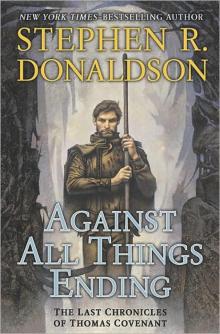 Against All Things Ending
Against All Things Ending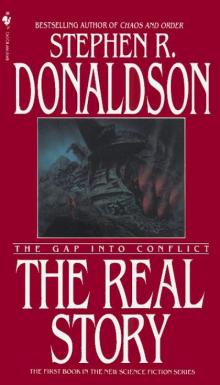 The Real Story: The Gap Into Conflict
The Real Story: The Gap Into Conflict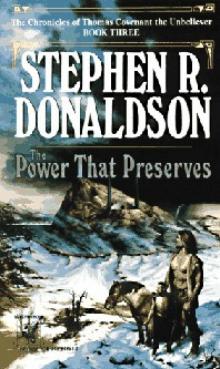 The Power That Preserves
The Power That Preserves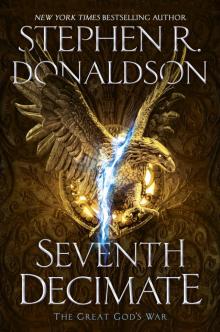 Seventh Decimate
Seventh Decimate The Gap Into Power: A Dark and Hungry God Arises
The Gap Into Power: A Dark and Hungry God Arises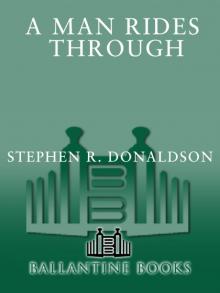 A Man Rides Through
A Man Rides Through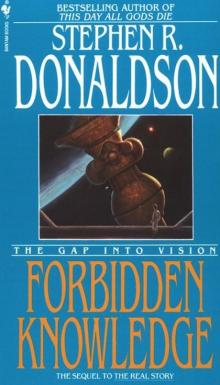 The Gap Into Vision: Forbidden Knowledge
The Gap Into Vision: Forbidden Knowledge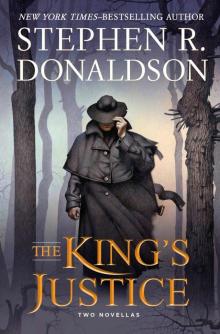 The King's Justice: Two Novellas
The King's Justice: Two Novellas The Wounded Land
The Wounded Land The Runes of the Earth
The Runes of the Earth Mordant's Need
Mordant's Need The One Tree
The One Tree Gilden-Fire
Gilden-Fire Reave the Just and Other Tales
Reave the Just and Other Tales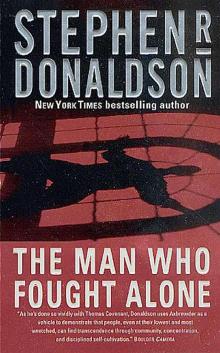 The Man Who Fought Alone
The Man Who Fought Alone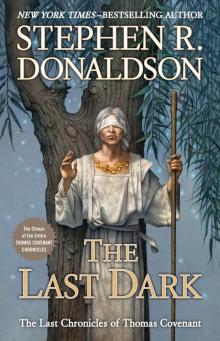 The Last Dark
The Last Dark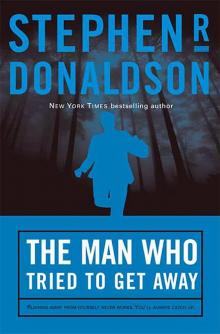 The Man Who Tried to Get Away
The Man Who Tried to Get Away Thomas Covenant 02: The Illearth War
Thomas Covenant 02: The Illearth War A Dark and Hungry God Arises
A Dark and Hungry God Arises The One Tree t2cotc-2
The One Tree t2cotc-2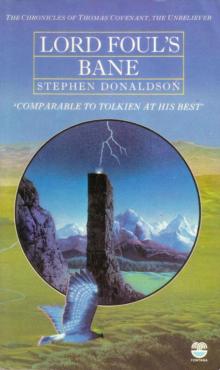 Lord Foul's Bane cotc-1
Lord Foul's Bane cotc-1 The Illearth War t1cotc-2
The Illearth War t1cotc-2 The Runes of the Earth: The Last Chronicles of Thomas Covenant - Book One
The Runes of the Earth: The Last Chronicles of Thomas Covenant - Book One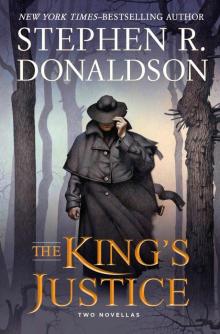 The King's Justice
The King's Justice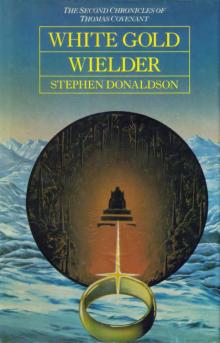 White Gold Wielder t2cotc-3
White Gold Wielder t2cotc-3 The Power That Preserves t1cotc-3
The Power That Preserves t1cotc-3 Thomas Covenant 01: Lord Foul's Bane
Thomas Covenant 01: Lord Foul's Bane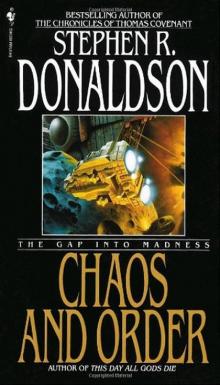 Chaos and Order: The Gap Into Madness
Chaos and Order: The Gap Into Madness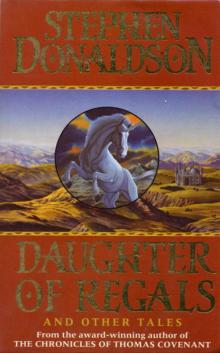 Daughter of Regals
Daughter of Regals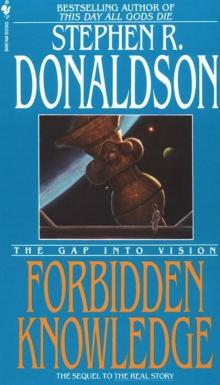 Forbidden Knowledge: The Gap Into Vision
Forbidden Knowledge: The Gap Into Vision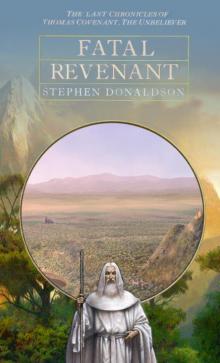 Fatal Revenant t3cotc-2
Fatal Revenant t3cotc-2 The Runes of the Earth t3cotc-1
The Runes of the Earth t3cotc-1 Thomas Covenant 03: Power That Preserves
Thomas Covenant 03: Power That Preserves This Day all Gods Die: The Gap into Ruin
This Day all Gods Die: The Gap into Ruin The Wounded Land t2cotc-1
The Wounded Land t2cotc-1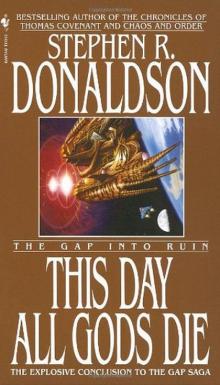 This Day All Gods Die
This Day All Gods Die One Tree
One Tree